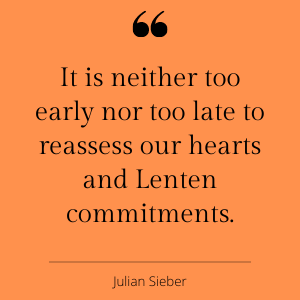 A Reflection for Friday after Ash Wednesday
A Reflection for Friday after Ash Wednesday
Is there a worse feeling than taking that huge—and totally unconscious—first bite of your ham and salami sandwich during your lunch break on the first Friday of Lent?
My apologies if that is you right now.
And then the inner turmoil that ensues. Do I stop eating because I should fast? Do I keep eating because to throw it out is to waste food? Surely there is no greater moral quandary known to humankind.
It may seem strange, not even three days into Lent, to read a passage from Matthew that seems to suggest that fasting is unnecessary.
Today’s reading from Isaiah helps give more depth to Jesus’s impressive response. When asked why his followers didn’t fast, as would have been customary for his Jewish disciples, Jesus’s snappy one-liner surprises, inverts the conversation and is rooted in the Hebrew Scriptures.
Jesus identified deeply with the prophetic voice of Isaiah. In today’s first reading, Isaiah criticizes those who fast while at the same time act selfishly and treat others poorly. Isaiah doesn’t argue against fasting itself, but argues that the act of fasting can very quickly turn into a self-improvement project or a religious PR campaign (Isaiah 58:3-4). Instead, he calls for fasting that is centered around:
“releasing those bound unjustly,
untying the thongs of the yoke;
Setting free the oppressed,
breaking every yoke;
Sharing your bread with the hungry,
sheltering the oppressed and the homeless;
Clothing the naked when you see them,
and not turning your back on your own” (Isaiah 58:6-7).
In this story, Jesus’s internalization of Isaiah’s argument is what enables such a quick, clear and subversive response to his critics. Perhaps what Jesus means, like Isaiah’s argument, is that if I were to fast and mourn while in my best friend’s bridal party, this would not be wrong simply because fasting is wrong. It would be wrong because I am making the wedding about myself, when it really shouldn’t be.
At its essence, Isaiah and Jesus both criticize a kind of fasting that causes a person to look more inwardly at themselves alone.
On this first Friday of Lent, it is neither too early nor too late to reassess our hearts and Lenten commitments.
Ultimately, your choice to continue eating the sandwich or not is only important so far as it orients you away from yourself and towards Christ. As we read later in Matthew 25, Christ is found exactly in “the least of these”—the hungry, thirsty, the stranger, the naked, the sick and imprisoned. How similar this is to Isaiah’s definition of what, or who, an appropriate fast looks like.
In such an already-sparse Lenten season, this is the highly challenging prompt of today’s readings: What does it mean for you to fast in a way that prevents you from turning in towards yourself and “turning your back on your own”?



